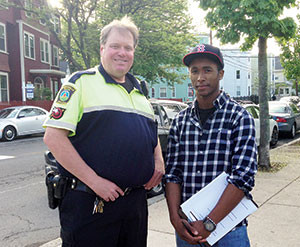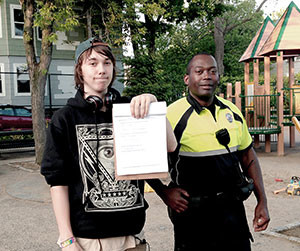
The youths of Teen Empowerment will be spending some quality time with members of the Somerville Police Department, each getting to know and understand the other a bit better. (L to R) Officer Mike Wyatt and Marco Jean Baptiste
By Josie Grove
“When was the last time you saw five police officers together in uniform with citizens?” asked Somerville Police Chief David Fallon. Last Tuesday, five uniformed officers from the Somerville Police Department gathered with a group of youth organizers from Teen Empowerment, a group focused on building community in Somerville, Boston, and Rochester, NY. This was the first of seven “walking dialogues” between Somerville residents, police, and Teen Empowerment.
Heang Ly, Teen Empowerment’s Director of Consulting and Training, was with the group at Hodgkins-Curtin Park last Tuesday. “Teen Empowerment and the Somerville Police Department have been doing dialogues for many years,” she explained. “We want to show the police and youth walking together, but also use the program to build up that relationship with the community.”
In groups of two, one police officer and one youth organizer, the group walked near Hodgkins Curtin Park, administering a survey to passerby as a way to spark conversation. Terence McCall, one of the youth organizers with Teen Empowerment said, “The survey is asking what important issues are you concerned about in the community, what concrete actions the police can take, and thoughts about the dialogue.”
Steve St. Hilaire, a twenty-year veteran of the Somerville police, observed, “Old and young, it’s all the same concerns: speeding cars and snow removal.” St. Hilaire likes the walking dialogue, because it allows him to interact with people outside the context of a stop. “We’re able to come out and actually speak with the youth instead of going into the park and busting them for drinking. We’re getting to know them, and they’re getting to know us.”
Chief Fallon said, “The program sends a visible message to the community. This is giving people a different outlook on police officers, so they don’t have a problem asking a police officer for help.” The walking dialogues are different from past dialogues because the police are bringing the conversation to the community, rather than waiting for people to show up, said Fallon.

Austin with Teen Empowerment and Officer Steve St. Hilaire.
“The idea is to let Teen Empowerment lead it,” said Fallon. In practice this meant that the Teen Empowerment organizers approached residents and asked questions, while the police officers hung back. Few police officers spoke directly to residents.
Marco Jean Baptiste is another organizer with Teen Empowerment. He thought the dialogue on Tuesday went well. “People that talked to us didn’t have too many concerns. Everyone’s been willing to talk to us.” Jean Baptiste was paired with police officer Mike Wyatt. The two were chatting amiably through the evening. Jean Baptiste asked Wyatt about the weirdest call he ever got as a police officer, and Wyatt launched into a story about a car bomb he had to deal with on Thanksgiving in 2005. “Everyone has their own stories,” said Jean Baptiste. The pair smiled and laughed, exemplary of the program’s goals to create relationships between police and Somerville youth. Both were pleased with the dialogue’s progress on Tuesday. “So far so good,” said Wyatt. “So far so good indeed,” echoed Jean Baptiste.
Not everyone believes the program is beneficial. One critic is Reverend Jason Lydon, the Boston-based national director and founder of Black and Pink, an organization that works toward the abolition of prisons. Rev. Lydon sees potential harm in close relationships between youth and the police. “I see a lot of danger,” Lydon cautioned. “If the police and the young person develop these supposedly cordial relationships, the anxiety about being impolite could prevent youth from remembering their rights during a police stop.” For example, he said, a person stopped by an officer he or she has a relationship with might be more likely to consent to being searched. Rev. Lydon also noted that similar programs promoting closer police-community relations have not been shown to reduce harm in those communities.
The reaction from community members was largely positive. Somerville resident Matthias Schneider liked that the police were trying to get familiar with the community. “I think that was the first time I’ve talked to someone from the police. They were very nice. It’s very good for the kids to see that the police do not always mean big trouble.”
There will be plenty more opportunity for the police to meet residents during the six upcoming walking dialogues this summer.
















Reader Comments